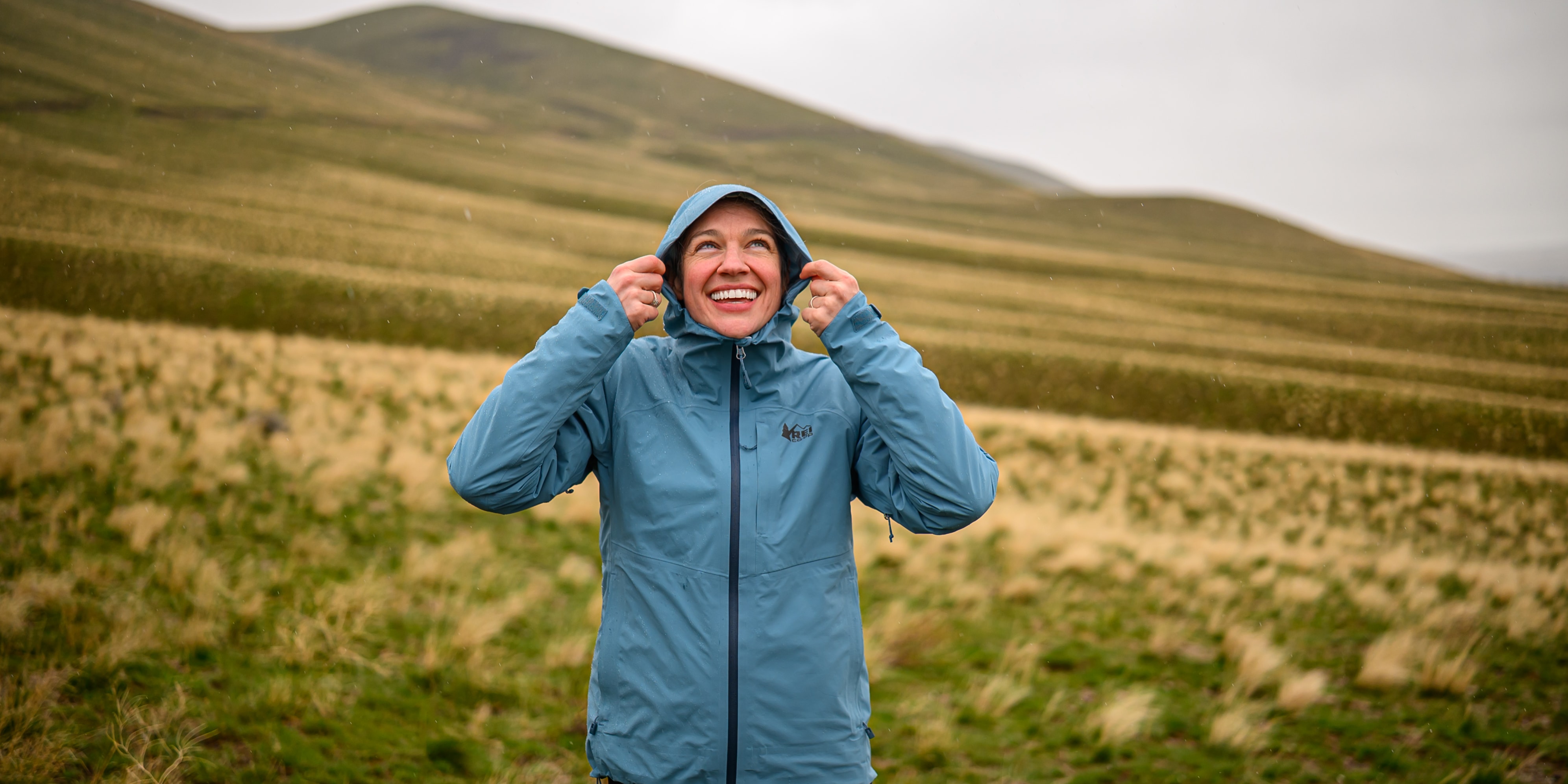When I first moved to Seattle from the Midwest 16 years ago, I didn’t own a rain jacket and never had. It’s not that I didn’t spend time outside in the rain; I just got wet. Or I’d carry an umbrella. I have vague childhood memories of my dad throwing a plastic poncho over me when our canoe got caught in an afternoon downpour, but waterproof clothing wasn’t a closet staple.
But now I was living in a city infamous for its precipitation. Plus, I got a job working at the REI Seattle Flagship store as a sales specialist. My new friends there, well-versed in essential outdoor gear for the local conditions, let me know it was time: I was a Seattleite now, and I’d somehow also become a person who went hiking in my free time.
I needed a rain jacket.
If you’re reading this article, it’s safe to assume you, too, are at a crossroads. Perhaps you need a new rain jacket, whether it’s your first (welcome to the club!), a replacement or an upgrade. I still work for REI—albeit now as a product copy editor at headquarters. The co-op has been designing and making its own gear for decades from its headquarters near Seattle. Who’s better qualified to make rain gear than a bunch of Pacific Northwesterners?! I even live down the street from one of the co-op’s longtime product prototypers—you can see multiple sewing machines through his living room window—so I’m especially tickled by the idea of relying on gear that got its start right here in Rain City, USA.
Still, it can be overwhelming to try to figure out which product is the best choice for you. Below, I take the guesswork out by comparing the four REI Co-op rain jackets available this spring. I share what I’ve learned from my own shopping journey and from REI designers and prototype testers.
Read on for the full article or click on the links below to jump ahead to a section:
- Overview: A quick look at the Teris GTX, XeroCloud 3L, Rainier and Trailmade REI Co-op rain jackets
- The Details: Drilling down on the design details of each jacket, from waterproofing to breathability and more
- Conclusion: Which jacket is right for you?
Overview of REI Co-op Rain Jackets
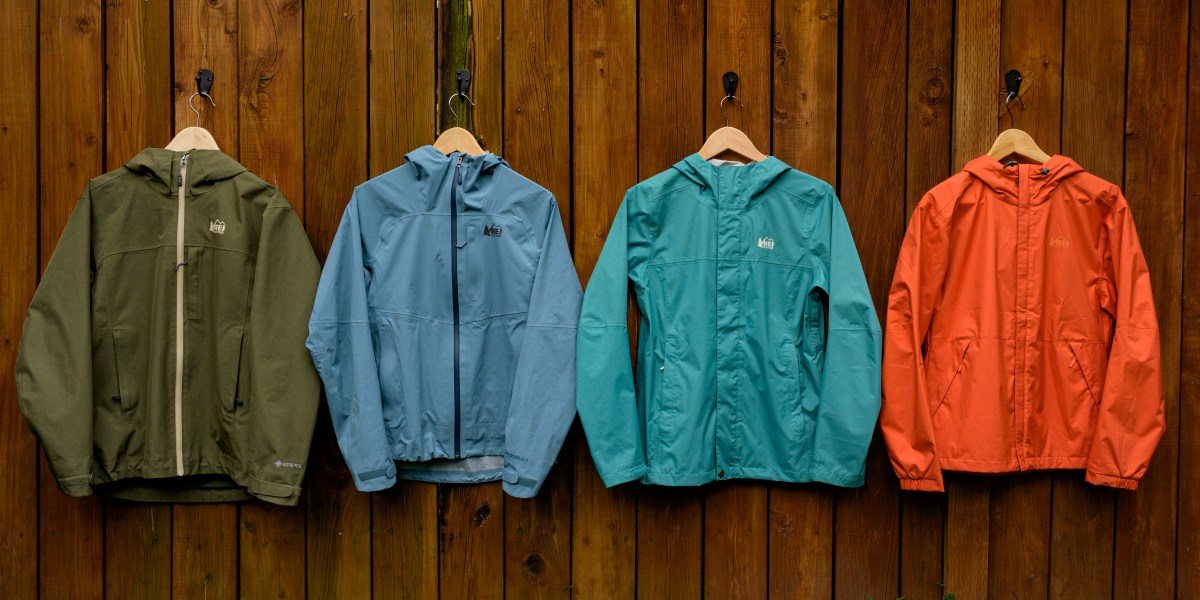
George Orozco
REI Co-op Teris GTX Rain Jacket ($249; Women’s and Men’s)
New for spring 2025, this is the co-op’s burliest rain jacket, which features a 2-layer GORE-TEX waterproof/breathable membrane. A loose-hanging internal liner adds some warmth as well as some weight. It’s got all the bells and whistles for technical performance on the trails, around town, or even on the slopes.
REI Co-op XeroCloud 3L Rain Jacket ($189; Women’s and Men’s)
Also new for spring 2025, this is the co-op’s top-tier technical, lightweight rain jacket for hiking and backpacking. It’s the only jacket in this batch with 3-layer waterproofing: a HydroWall™ 3L laminatethat gives it exceptional waterproof performance and breathability. It also features stretchier fabric, elevated trim details and an advanced feature set, which I’ll dive more into soon.
REI Co-op Rainier Rain Jacket ($99.95; Women’s and Men’s)
This is the co-op’s flagship rain jacket—beloved for years by REI Co-op Members and updated in recent years with 100% recycled ripstop nylon shell fabric. It features a 2.5-layer HydroWall™ waterproof/breathable laminate plus many of the same technical features as premium rain shells—pit zips, ample adjustability, packability into its own pocket—but at a bangin’ price point.
REI Co-op Trailmade Rain Jacket ($69.95; Women’s and Men’s)
REI introduced its Trailmade collection in spring 2023, welcoming new hikers and backpackers with fun, approachable gear that can be worn on the trail or around town. This jacket is intentionally simple and streamlined to make it easy to get outside and go. And like many products in the Trailmade Collection, its design was informed by an REI inclusion advisory panel of BIPOC, LGBTQ+, body-positive and adaptive communities.
The Details
Now, let’s get into the weeds to understand what sets these rain jackets apart from each other. Read on or click on the links below to jump to a section.
- Fabric and Waterproofing
- Breathability
- Pockets
- Hood Design
- Cuff and Hem Adjustments
- Weight
- A Final Note on Fit
Fabric and Waterproofing
Let’s start with a rain jacket’s most important job: keeping you dry!
All four jackets share some basic elements: water-resistant fabric that’s been treated with a nonfluorinated durable water repellent (DWR) finish, a waterproof/breathable laminate, and taped/sealed seams to prevent water seepage.
The Teris, XeroCloud and Rainier are fully seam-sealed. That means all seams are reinforced on the inside to maximize the jacket’s waterproofness. The Trailmade is designed for moderate, everyday activities; only its critical seams (the most exposed ones) are sealed—in this case, the hood, shoulders and tops of the sleeves. The jacket will keep you dry on a drizzly hike or dog walk but may be more susceptible to water seepage on longer hikes in heavy rain. (Pro tip: If your rain jacket ever starts wetting out on you, the DWR is easy to revive. Here’s how.)
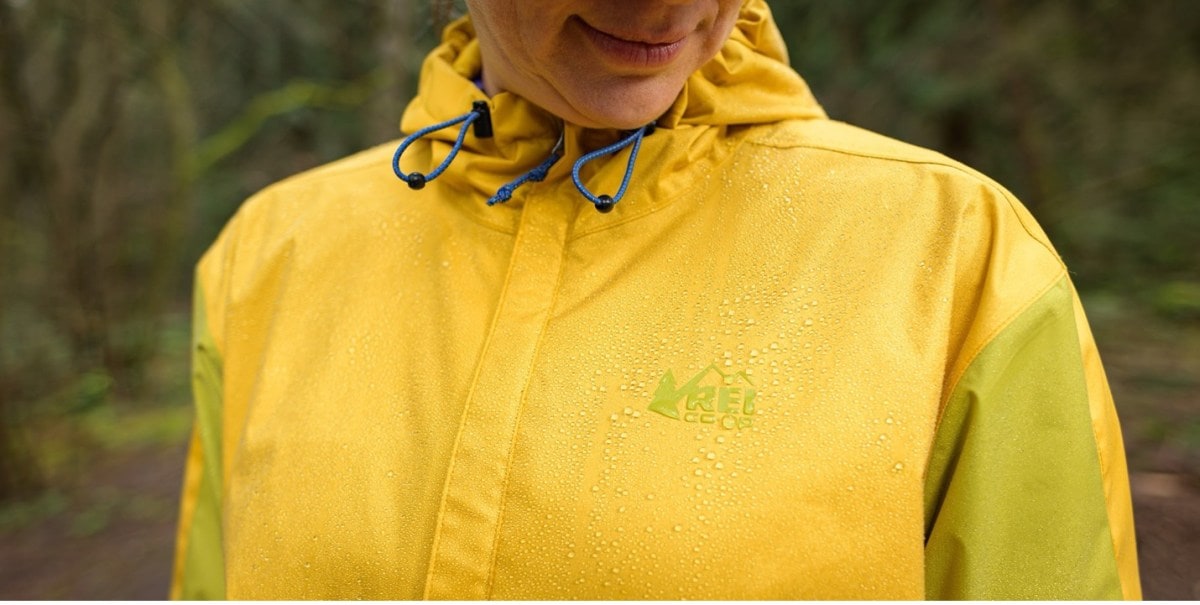
Beyond the seam taping, much of the differences between these four jackets comes in the construction method of the waterproof/breathable laminate. All four are considered waterproof and breathable, but the number of layers in the construction method leads to differences in breathability, lining design and jacket weight.
The Teris GTX features GORE-TEX in a 2-layer construction, while the XeroCloud, Rainier and Trailmade feature a proprietary (exclusive to REI) HydroWall™ laminate (3-layer on the XeroCloud; 2.5-layer on the Rainier; 2-layer on the Trailmade). What does all that mean, you might ask?
The 2-layer construction of the Teris and Trailmade combines an outer layer bonded to the waterproof/breathable laminate with a full, hanging inner liner. The liner fabric differs a bit in these jackets, but the effect is similar: It gives them a comfortable feel on the inside and adds more warmth for year-round wear without significant layering.

George Orozco
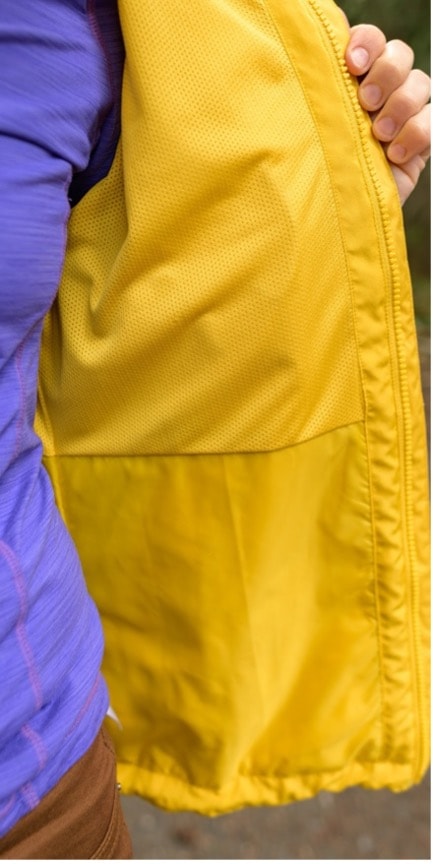
By contrast, the Rainier jacket’s 2.5-layer HydroWall™ waterproof/breathable laminate means it has a durable outer fabric, a waterproof barrier applied inside of that, and then a thin protective sheen—that’s the half layer—laid inside of that to help protect the laminate. This keeps the jacket lighter than 2-layer jackets like the Trailmade or Teris.
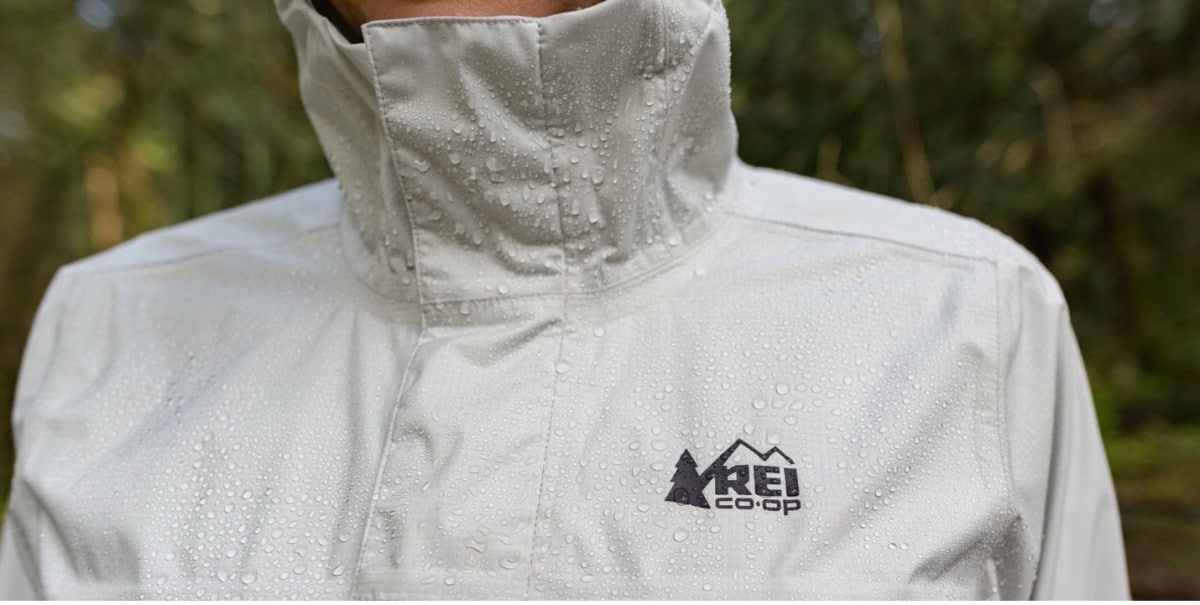
The XeroCloud is the only rain jacket among the four with a 3-layer construction, which is generally considered the highest quality and most breathable waterproof construction. In it, the liner fabric is bonded to the membrane to protect it—a construction method that renders the entire jacket lighter and more breathable.
As for texture and feel, you almost have to see and touch these jackets to appreciate the differences in their shell fabrics. Still, I’ll do my best here:
The Rainier and Trailmade feel and sound like classic rain jackets. They’re louder and more textured—you’ll notice a crinkle sound.
The XeroCloud and Teris GTX are made with a softer, quieter fabric. They could easily be mistaken for a soft shell but are indeed waterproof.
Breathability
The more energy you plan to exert while wearing your jacket, the more important breathability becomes. After all, a waterproof jacket won’t keep you dry if you’re sweating profusely inside of it. One way rain jackets get their breathability is with pit zips: underarm vents that can be unzipped to provide more cooling airflow to your body. These vents are especially valuable on rainwear, since waterproof membranes make jackets inherently less breathable than non-waterproof options like soft shells or fleeces.
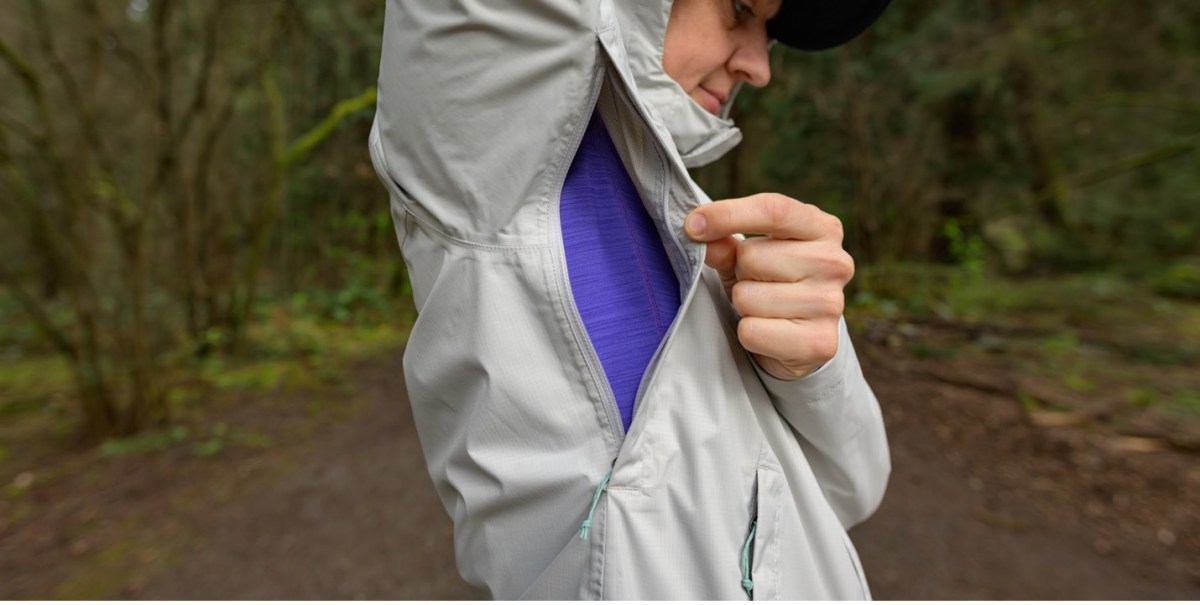
Pit zips add breathability to the Teris GTX, XeroCloud 3L and Rainier, making them great for moderate physical activity like hiking and backpacking. The Trailmade does not have pit zips and is best for casual wear or hiking in light rain.
Unzip the hand pockets for even more breathability. A thing I didn’t know until I started working at REI: If you’re not storing anything in a jacket’s hand pockets, you can leave them unzipped to boost the jacket’s breathability whenever you’re working up a sweat.
The hand-pocket hack will work for both the XeroCloud 3L and Rainier, but not the Trailmade or the Teris GTX. While the hand pockets on all four jackets are mesh-lined, the 2-layer construction of the Trailmade and Teris GTX means their hand pockets have a solid layer between them and your body, so unzipping the hand pockets doesn’t provide the same airflow as on the XeroCloud 3L and Rainier. (This is not really a concern on the Teris GTX, since it already has generously sized pit zips for venting.)
Pockets
Thank goodness for pockets. Not only do they let me keep things like my phone handy on the trail, but they also help keep my hands warm on cold hikes if (when) I forget my gloves.
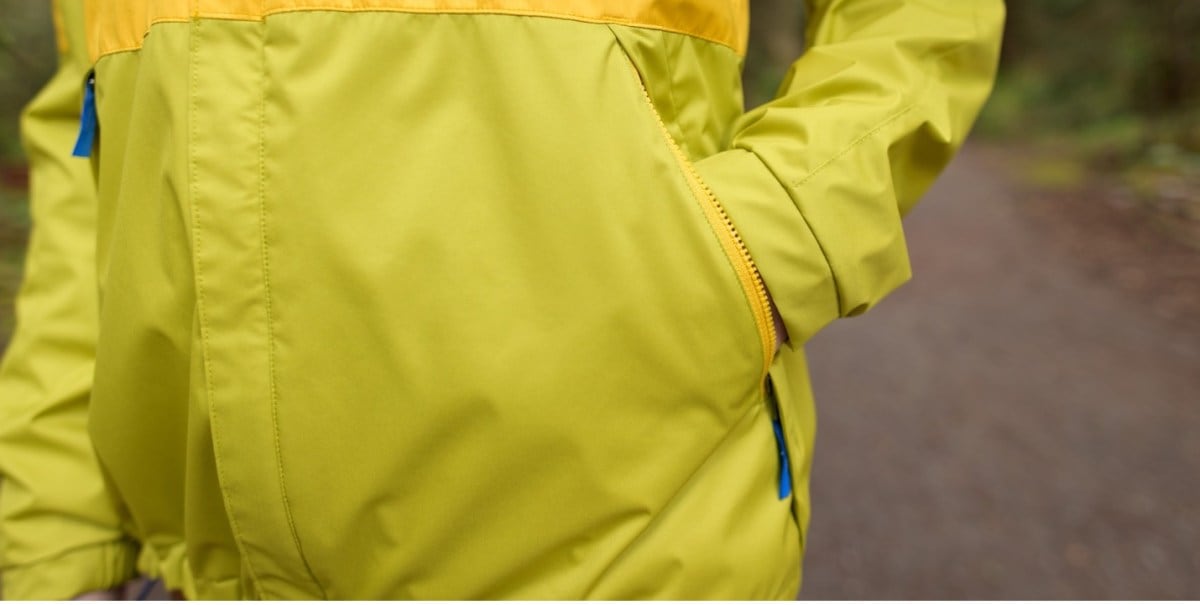
All four jackets have zippered hand pockets. The higher-priced XeroCloud and Teris GTX have an additional zippered chest pocket.
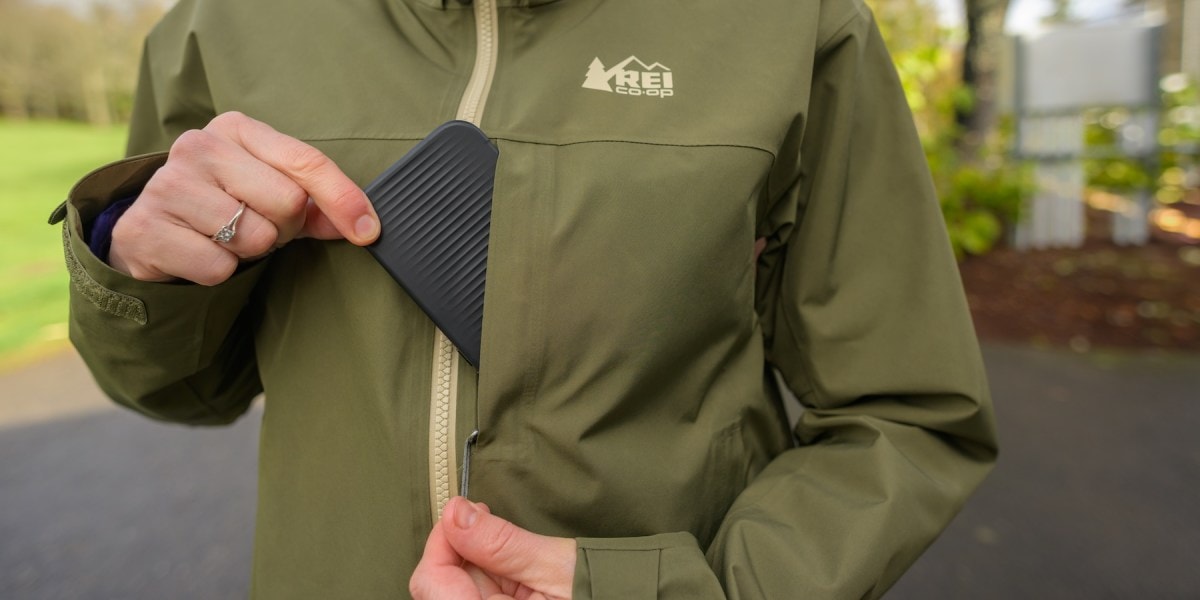
George Orozco
The Trailmade keeps things streamlined with just the two hand pockets, while the Rainier also features two large interior drop-in pockets: spacious enough for your phone, wallet or even a spare hat or pair of gloves.
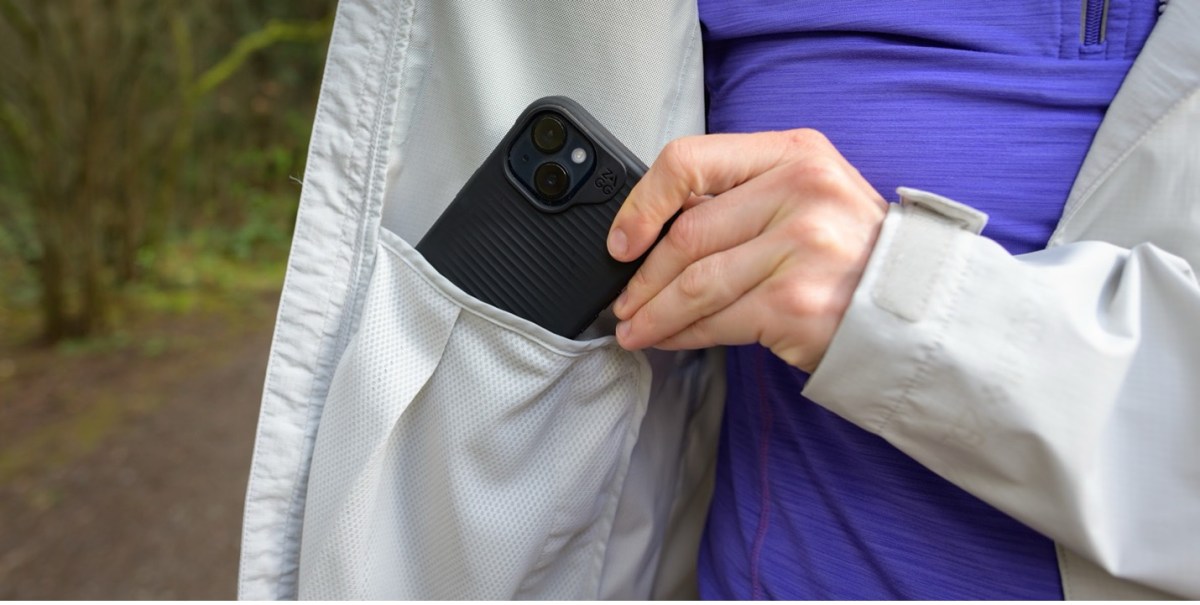
Hood Design
If you think all jacket hoods are created equal, think again. You’d be amazed how much research and development goes into a rain jacket’s hood—and how the various design details and adjustment mechanisms can affect your wearing experience. (Another pro tip, which applies to all rain jackets: Wear a ball cap or trucker hat underneath the hood to help give it some structure, improve your visibility and also keep that sideways rain out of your eyes.)
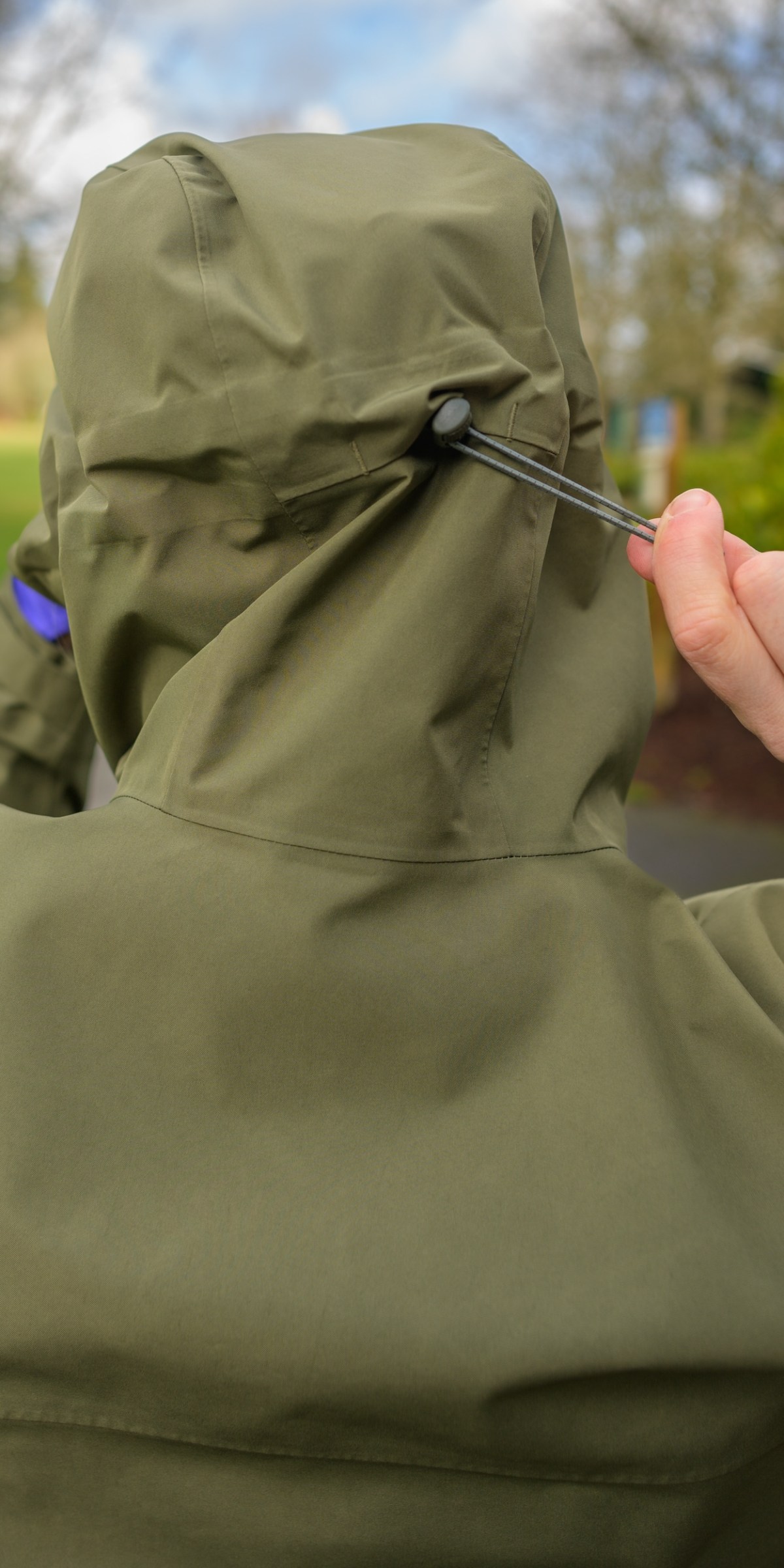
George Orozco
The hood on the Teris offers the most adjustability of these four jackets. Dual front bungees (hidden for a sleek look) cinch down the hood. A cinchable rear bungee allows for an even tighter fit to minimize interference with your peripheral vision.
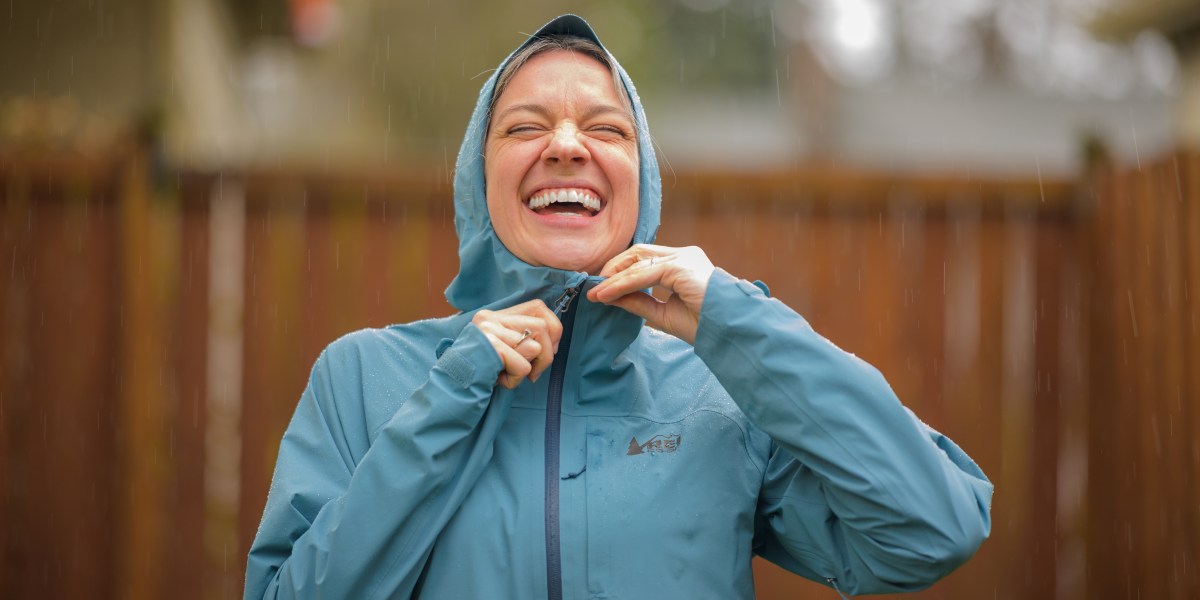
The XeroCloud features a cinchable rear bungee on the hood as well, but no separate front adjustments. One standout feature it does have is a nice tall hood collar with some structure built in for good neck coverage in front, regardless of whether you have the hood pulled up or not.

Similar to the Teris, the Rainier has dual hood-adjustment bungees in the front, hidden inside the collar for a clean look. In the back, it features a simple vertical hook-and-loop strap that can be tightened to shift the hood’s built-in visor a little higher up on your forehead.
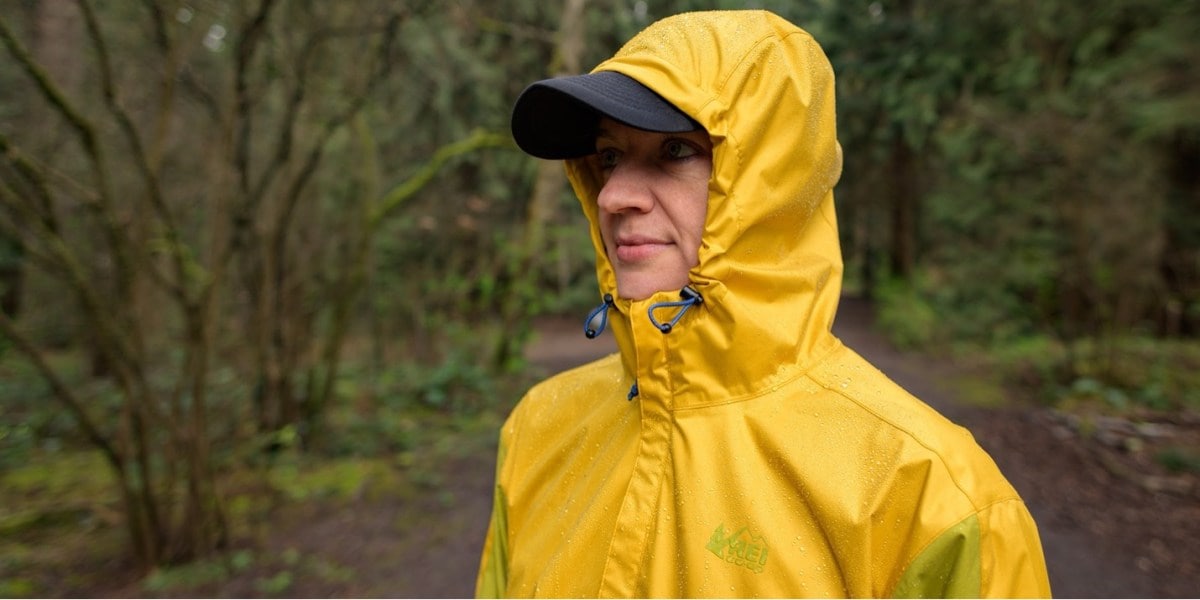
The Trailmade features a simple hood. You can cinch it down with dual bungee cords on either side of the chin.
Cuff and Hem Adjustments
All four jackets offer a bungee-cinchable bottom hem to seal out cold air and rain, but there are a few differences in the level of adjustability and the fit they provide.
The Rainier and Trailmade have single hem bungees, while the Teris and XeroCloud offer one on each side. This allows for an even more customized fit around the hips.
The Teris and XeroCloud share another premium feature: slightly longer sleeves with slanted cuffs. that provide your wrists and hands with a little extra coverage from the rain.
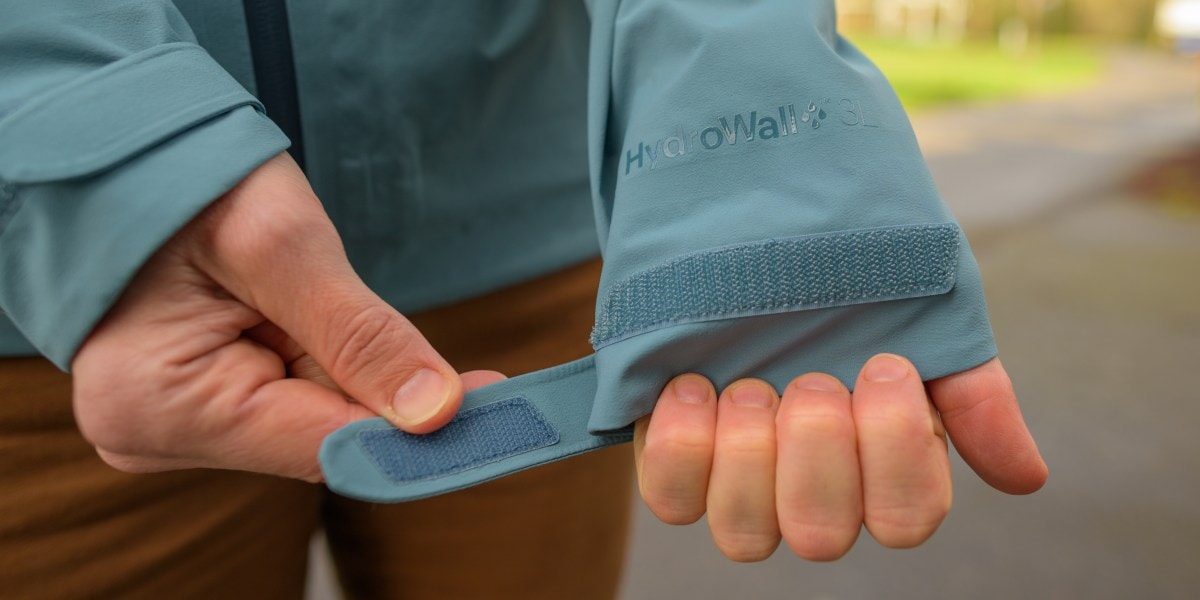
The cuffs on the Teris, XeroCloud and Rainier adjust with a hook-and-loop strap. The cuffs on the Trailmade are not adjustable but they are partly elasticized, which I found did a great job keeping the rain out and my sleeves in place, without having to adjust any straps or toggles.
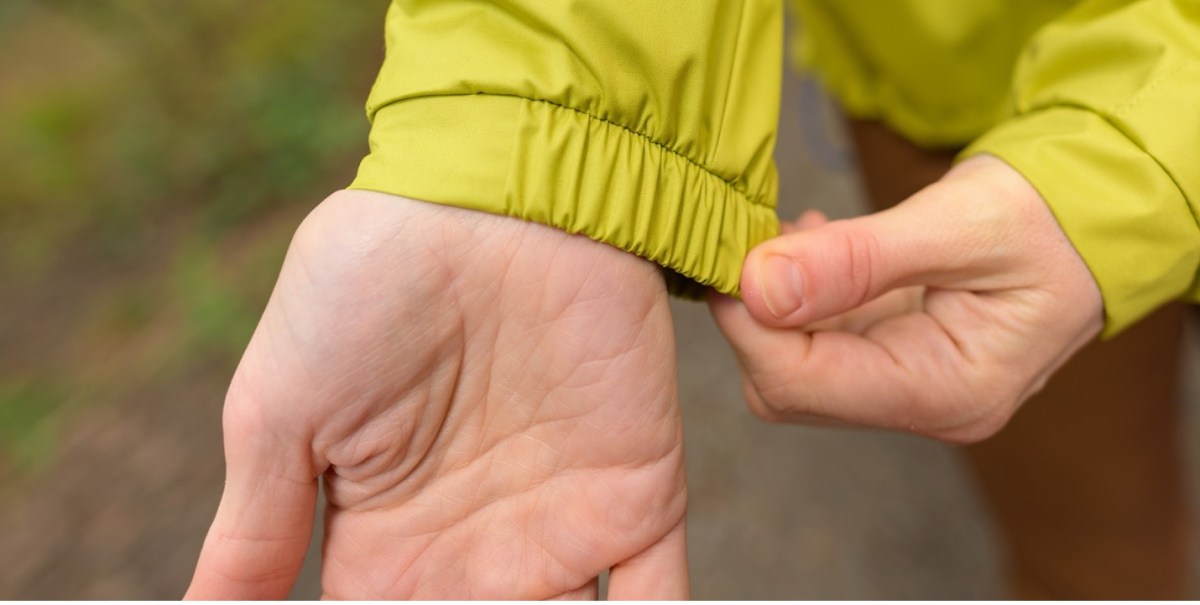
Weight and Packability
The Teris GTX is the heaviest of these four jackets, partly due to the weight of its hanging liner. It tips the scales at 20.5 ounces for the women’s and 24 ounces for the men’s.
The Trailmade is also slightly heavier, due in part to its hanging liner, but still clocks in under a pound in most sizes. The women’s weighs 13.1 ounces and the men’s weighs 15.5 ounces.
The Rainier and XeroCloud 3L jackets are the lightest of these four jackets. If you count ounces when choosing gear, look no further than the Rainier (at 9.9 ounces for a women’s small, and 11.2 ounces for a men’s medium), and the XeroCloud 3L (11.3 ounces for the women’s; 13.4 ounces for the men’s).
The XeroCloud 3L and the Rainier both have a designated “packable” pocket. You can stuff the entire jacket into its own left-hand pocket as a neat little storage pouch, with a double-sided zipper and bungee hang cord.
A Final Note on Fit
All of these are sized to fit layers underneath as needed.
You can find a size chart on the individual product pages for each jacket. As part of the co-op’s commitment to inclusive design practices, all four jackets are available in a range of sizes from Women’s XS to 3X to Men’s S to XXL Tall. My body measurements put me at the upper end of the women’s size small range; I can still easily fit a base layer and lightweight puffy jacket underneath a small in any of these jackets.
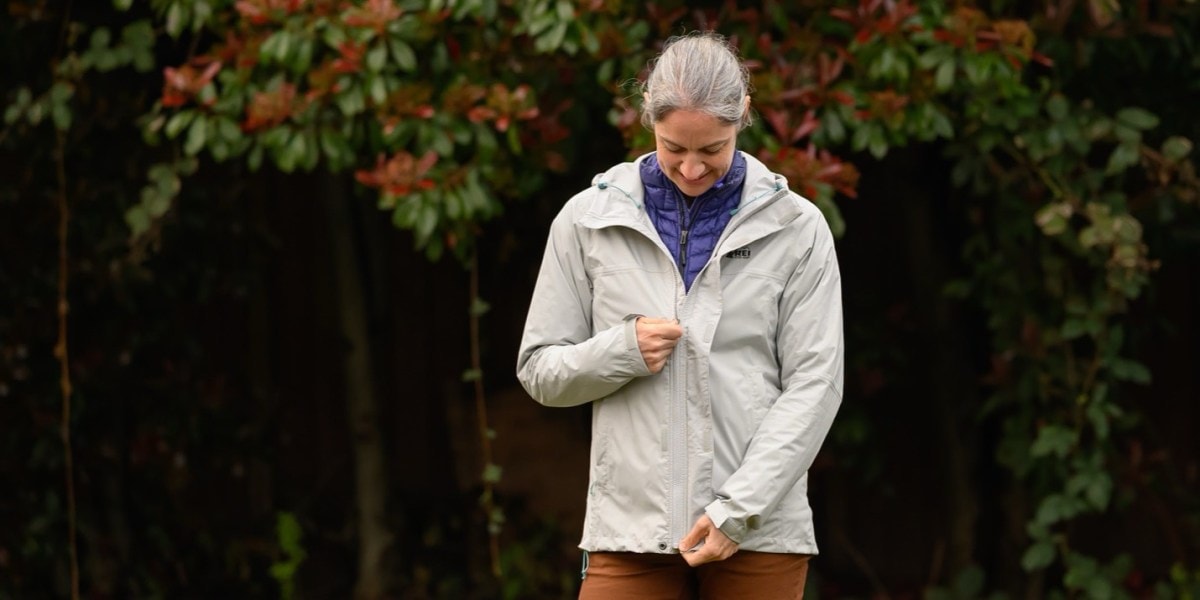
That said, each jacket is cut slightly differently to suit varying fit preferences.
The Teris GTX boasts the most generous fit of these four jackets. It has ample layering room through the torso, slightly longer sleeves, a droptail hem (longer in the back than in the front) and an extra inch or two in overall length compared to the other jackets.
Conclusion
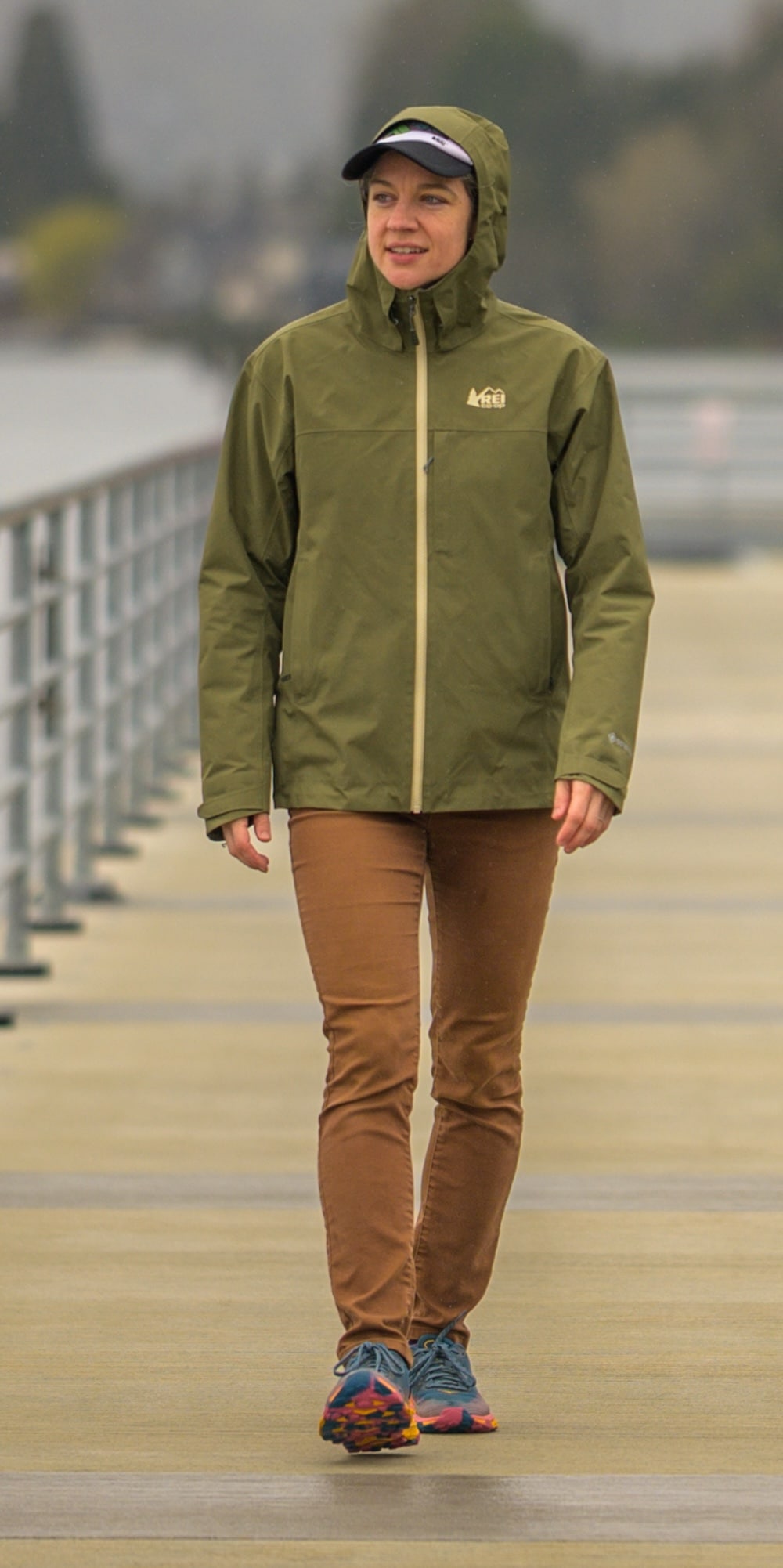
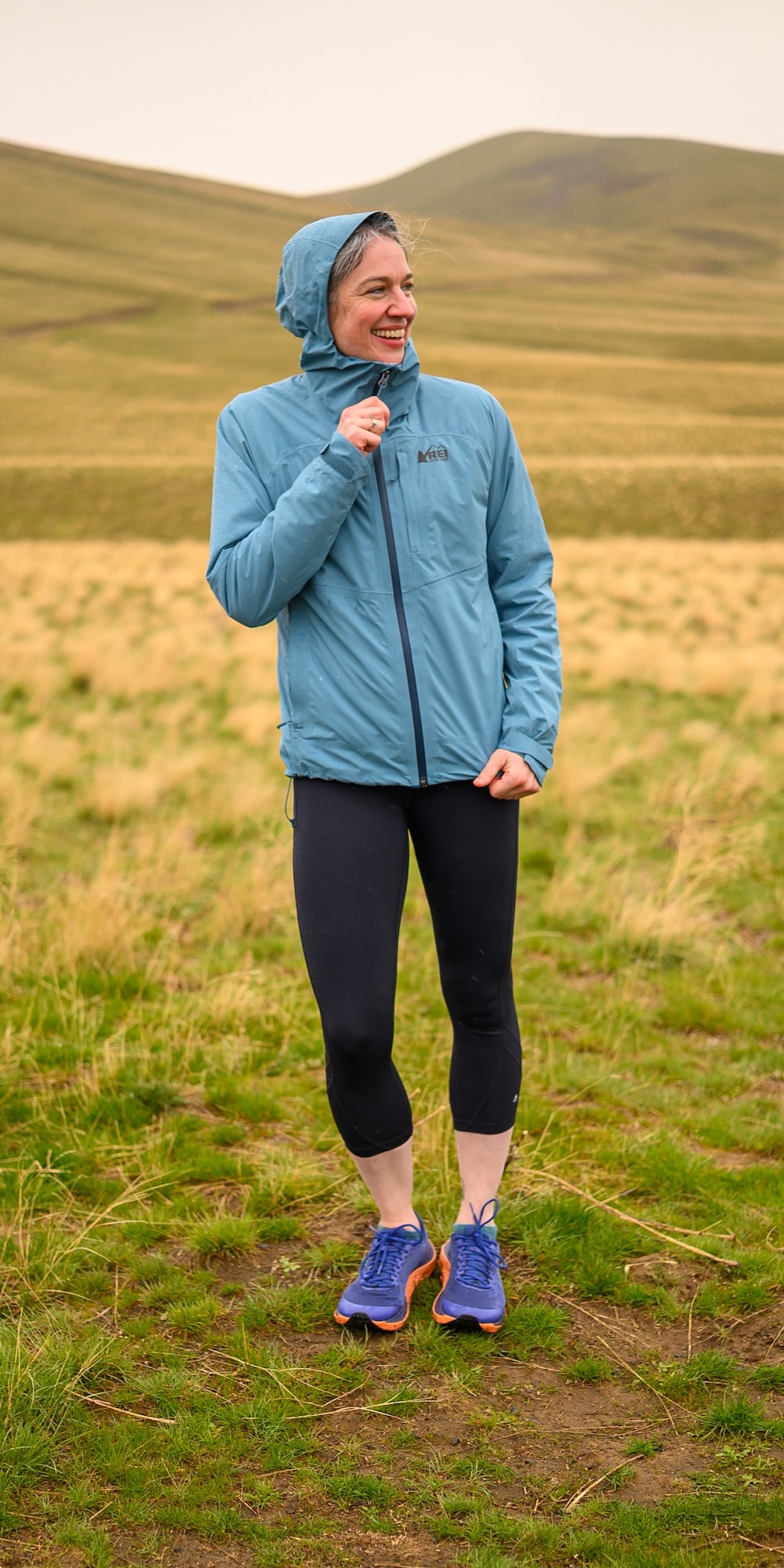
The XeroCloud 3L fits closest to the body of these four jackets, particularly through the waist. This is not to say it runs small! It fits true to size but features a more contoured fit with slightly less room for layering underneath. Like the Teris GTX, it has a more pronounced droptail hem than the other two jackets, and slightly longer sleeves as well. I was able to fit a base layer and lightweight puffy jacket underneath the XeroCloud but doing so made me look a little more “stuffed” than with the other three rain jackets, so if you plan on regularly layering this over a thicker puffy, you might consider ordering one size up.
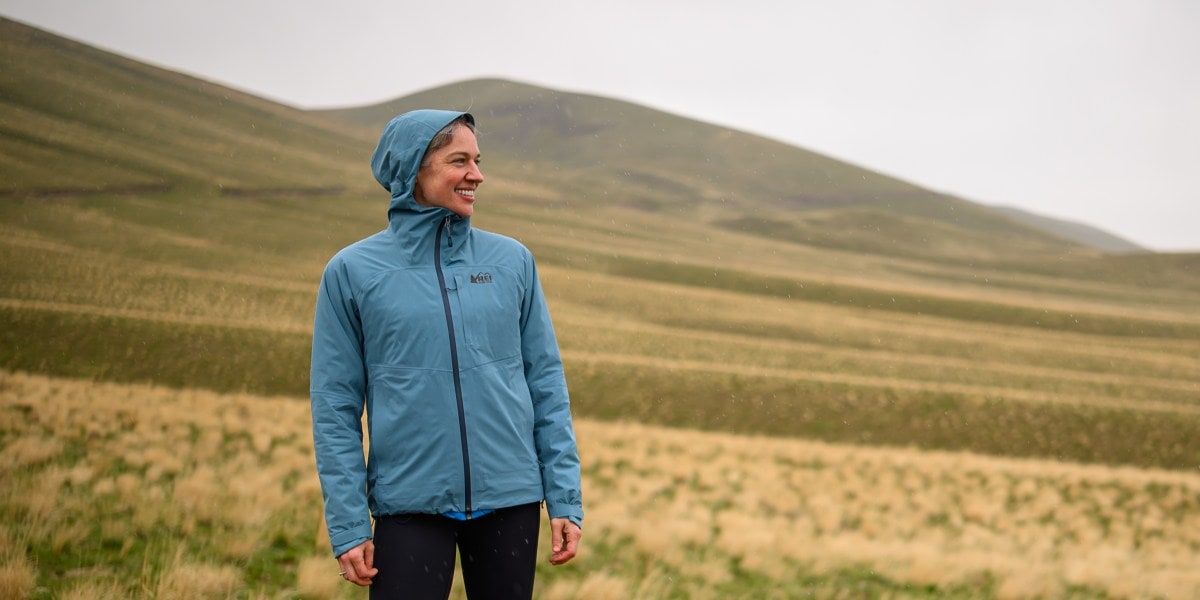
The Rainier has a standard fit. Compared to the XeroCloud, it offers slightly more room for extra layers underneath.

The Trailmade has a slightly boxier fit than the other three jackets. It has a generous cut through the chest and waist, plus a slightly shorter length in both front and back.
Conclusion: Which REI Co-op rain jacket is right for you?
Choose the Teris GTX rain jacket (women’s, men’s) if you value durability, a roomy fit and high-end weather protection, and aren’t seeking a super lightweight jacket. It performs well in moderate to heavy rain and is burly enough for use as a light skiing jacket or casual shell for everyday wear.
Choose the REI Co-op XeroCloud 3L rain jacket (women’s, men’s) if you’re a hiker and/or backpacker looking to upgrade your outerwear to something top-tier. Its stretchy, comfortable fabric, excellent breathability and elevated details are perfect for those who love moving a little faster or going a little farther on the trail. The jacket is also available in a longer silhouette—for both women and men. And there’s a line of rain pants too.
Choose the REI Co-op Rainier rain jacket (women’s, men’s and women’s long line) if you’re looking for a high-performing jack-of-all-trades. The Rainier hits the sweet spot for many folks: It’s a full-featured waterproof jacket that’s lightweight, breathable and fully seam-sealed to keep rain out all day long. Its price point is hard to beat for everything you get with this tried-and-true piece of rainwear.
The Rainier is also the only one of these three jackets offered (with a less technical feature set) in kids’ and infant/toddlers’ sizes.

For the grownups, the women’s version is also available in a longer silhouette. If you, like me, enjoy sitting on benches on rainy days without getting your butt wet, the has you (literally) covered. (Or if you want full head-to-toe coverage, consider the Rainier rain pants).
Choose the REI Co-op Trailmade rain jacket (women’s and men’s) if you’re looking for a great price on a stylish, high-quality rain jacket you can wear every day and for exploring local trails. It comes in a variety of styles—fun patterns, bright colorblocking or more subdued colors—to suit your personal taste. It doesn’t have all the bells and whistles of more technical hiking jackets, but it will do a fine job keeping you dry in anything but prolonged downpours. The Trailmade line also includes rain pants as an option.
Curious which one was right for me?

My life looks a lot different now than it did when I was a newly anointed and rain-jacketless Seattleite 16 years ago. As a longtime REI employee, I’ve had the opportunity to expand my rain-jacket arsenal over the years to support my passions for hiking, backpacking and trail running.
My favorite trails these days are steep, long ones; I’m a sucker for a great summit view. I tend to sweat a lot, especially when I’m carrying my 4-year-old on my back. So, the comfortable fabric and exceptional breathability of the XeroCloud 3L really won me over.
In fact, I love it so much that I even wore it for the second half of a 100-miler I ran on Orcas Island in February, during which it rained on us all night long. While this jacket wasn’t necessarily designed specifically for running, a lot of ultrarunning is glorified speed hiking—and the fact that the XeroCloud kept me comfortable for 12 hours of high-exertion movement in wet, windy weather is a testament to its impressive waterproofing and breathability.
___
Editor’s note: This article was updated to include the new REI Co-op Teris GTX and XeroCloud Jackets.
